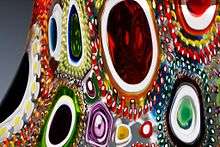Murrine
Murrine (singular: murrina) are colored patterns or images made in a glass cane that are revealed when the cane is cut into thin cross-sections. Murrine can be made in infinite designs from simple circular or square patterns to complex detailed designs to even portraits of people. One familiar style is the flower or star shape which, when used together in large numbers from a number of different canes is called millefiori.
Murrine production first appeared in the Middle East more than 4,000 years ago and was revived by Venetian glassmakers on Murano in the early 16th century.[1]
Once murrine have been made, they can be incorporated into a glass vessel or sculpture in several ways. A number of murrine may be scattered, more or less randomly, on a marver (steel table) and then picked up on the surface of a partially-blown glass bubble. Further blowing, heating, and shaping on the marver will incorporate the murrine completely into the bubble, creating a random arrangement of murrine in the vessel or sculpture beling blown.[2]
Alternatively, the murrine can be arranged in a compact pattern on a ceramic plate and then heated in a furnace until they fuse into a single sheet. The sheet can be formed over a mold (such as an inverted bowl shape) and further heated so that the murrine are slumped to take the desired form.[2]
Another technique using a sheet of murrine made as above is to make a small disc (collar) of molten glass on the end of a blowpipe, and then roll the disc along one edge of the sheet, picking up the sheet on the blowpipe in the form of a cylinder. The end of the cylinder opposite the blowpipe can be squeezed together and sealed. With further heating, the sealed cylinder can be blown and formed into any shape a glassblower can make.
Many notable glass artists regularly utilize murrine in their work. These include:
- Dante Marioni - American
- Richard Marquis - American
- David Patchen - American
- Stephen Rolfe Powell - American
- Richard Ritter - American
- Kait Rhoads - American
- Lino Tagliapietra - Italian
Examples of Murrine in Glass
 An example of simple murrine in a vessel by David Patchen.
An example of simple murrine in a vessel by David Patchen. A large murrine glass vessel by artist Dante Marioni. 39" high by 8" diameter.
A large murrine glass vessel by artist Dante Marioni. 39" high by 8" diameter. A murrine vessel by artist Giles Bettison. Approximately 8" x 5" x 1 1/2"
A murrine vessel by artist Giles Bettison. Approximately 8" x 5" x 1 1/2" Close-up of transparent murrine incorporated into a vessel by David Patchen.
Close-up of transparent murrine incorporated into a vessel by David Patchen. Multi-layered murrine on the outside of a vessel by David Patchen.
Multi-layered murrine on the outside of a vessel by David Patchen. A random pattern of different murrine incorporated into blown glass by David Patchen.
A random pattern of different murrine incorporated into blown glass by David Patchen. Close up of pattern of different murrine incorporated into blown glass.
Close up of pattern of different murrine incorporated into blown glass. A murrine glass panel by artist Giles Bettison. Approximately 30" x 18"
A murrine glass panel by artist Giles Bettison. Approximately 30" x 18"
See also
References
- ↑ Carl I. Gable, Murano Magic: Complete Guide to Venetian Glass, its History and Artists (Schiffer, 2004), p. 37. ISBN 0-7643-1946-9.
- 1 2 "Video: Murrine Use". Corning Museum of Glass. Corning Museum of Glass. Retrieved 5 June 2017.